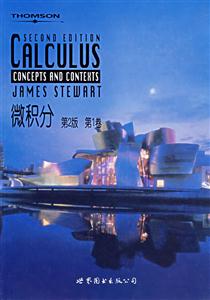微积分 第2版 第1卷 内容简介
the first edition was intended to be a synthesis of reform and traditional approaches to calculus instruction。in this second edition i continue to follow that path by empha- sizing conceptual understanding through visual, numerical, and algebraic approaches。the principal way in which this book differs from my more traditional calculus textbooks is that it is more streamlined。 for instance, there is no complete chapter on techniques of integration;i don't prove as many theorems (see the discussion on rigor on page xi);and the material on transcendental functions and on parametric equations is interwoven throughout the book instead of being treated in separate chapters。instruc- tors who prefer fuller coverage of traditional calculus topics should look at my books calculus, fourth edition and calculus: early transcendentals, fourth edition。 changes in the second edition~ the data in examples and exercises have been updated to be more timely。~ several new examples have been added。for instance, i added the new example 1 in section 5.4 (page 381) because students have a tough time grasping the idea of a function defined by an integral with a variable limit of integration。i think it helps to look at examples 1 and 2 before considering the fundamental theorem of calculus。
微积分 第2版 第1卷 目录
a preview of calculus
1 functions and models
1.1 four ways to represent a function
1.2 mathematical models
1.3 new functions from old functions
1.4 graphing calculators and computers
1.5 exponential functions
1.6 inverse functions and logarithms
1.7 parametric curves
laboratory project running circles around circles
review
principles of problem solving
2 limits and derivatives
2.1 the tangent and velocity problems
2.2 the limit of a function
2.3 calculating limits using the limit laws
2.4 continuity
2.5 limits involving infinity
2.6 tangents, velocities, and other rates of change
2.7 derivatives
writing project: early methods for finding tangents
2.8 the derivative as a function
2.9 linear approximations
2.10 what does f1 say about f?
review
focus on problem solving
3 differentiation rules
4 applications of differentiation
5 integrals
6 applications of integration
7 differential equations
8 infinite sequences and series
9 vectors and the geometry of space
10 vector functions
11 partial derivatives
12 multiple integrals
13 vector calculus
appendixes
index
微积分 第2版 第1卷 节选
The first edition was intended to be a synthesis of reform and traditional approaches to calculus instruction。In this second edition I continue to follow that path by empha- sizing conceptual understanding through visual, numerical, and algebraic approaches。The principal way in which this book differs from my more traditional calculus textbooks is that it is more streamlined。 For instance, there is no complete chapter on techniques of integration;I don't prove as many theorems (see the discussion on rigor on page xi);and the material on transcendental functions and on parametric equations is interwoven throughout the book instead of being treated in separate chapters。Instruc- tors who prefer fuller coverage of traditional calculus topics should look at my books Calculus, Fourth Edition and Calculus: Early Transcendentals, Fourth Edition。 Changes in the Second Edition~ The data in examples and exercises have been updated to be more timely。~ Several new examples have been added。For instance, I added the new Example 1 in Section 5.4 (page 381) because students have a tough time grasping the idea of a function defined by an integral with a variable limit of integration。I think it helps to look at Examples 1 and 2 before considering the Fundamental Theorem of Calculus。


